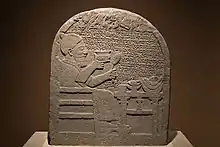Kuttamuwa stele
The Kuttamuwa stele is an 800-pound basalt funerary stele with an Aramaic inscription referring to Kuttamuwa, an 8th-century BC royal official. It was found in Sam'al, in southeastern Turkey, in 2008, by the Neubauer Expedition of the Oriental Institute at the University of Chicago.

The Kuttamuwa stele in the Gaziantep Archaeology Museum 4270
Description
The stele measures three feet tall and two feet wide. It was a stele for Kuttamuwa, an 8th-century BC royal official from Sam'al who ordered an inscribed stele, that was to be erected upon his death.
Inscription
The inscription requested that his mourners commemorate his life and his afterlife with feasts "for my soul that is in this stele." It is one of the earliest references in a Near East culture to a soul as a separate entity from the body.[1]
Bibliography
- Schloen, J., & Fink, A. (2009). New Excavations at Zincirli Höyük in Turkey (Ancient Samʾal) and the Discovery of an Inscribed Mortuary Stele. Bulletin of the American Schools of Oriental Research, (356), 1-13. Retrieved September 16, 2020
Notes
- "Found: An Ancient Monument to the Soul". New York Times. November 17, 2008. Retrieved 2008-11-18.
In a mountainous kingdom in what is now southeastern Turkey, there lived in the 8th century BC. a royal official, Kuttamuwa, who oversaw the completion of an inscribed stone monument, or stele, to be erected upon his death. The words instructed mourners to commemorate his life and afterlife with feasts "for my soul that is in this stele."
This article is issued from Wikipedia. The text is licensed under Creative Commons - Attribution - Sharealike. Additional terms may apply for the media files.